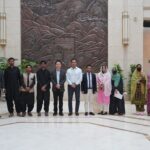GARHI KHUDA BAKHSH, Pakistan: The former President and the Pakistan People’s Party (PPP) Co-Chairman Asif Ali Zardari has said that the law about military courts would not be allowed to be used for settling political vendetta.
In his address to party supporters at the Bhutto mausoleum in Garhi Khuda Bakhsh in Larkana to mark Benazir Bhutto’s seventh death anniversary on Saturday, Zardari said that the PPP decided to support the military courts for the sake of security of the people and the country.
The decision of setting up military courts was taken under the national action plan adopted by all political parties in a meeting held last week following the deadly terror on the army public school Peshawar that left 150 persons including 134 innocent children dead.
The former president said that there is a need for military courts under the prevailing situation in the country.
“We will support military courts when we are sure they will not be used against a democratic party, a journalist or an intellect,” Zardari said.
The PPP co-chairman said while talking about the Peshawar school attack that if notice was taken when 450 PPP workers were killed in 2007 during General Musharraf’s regime, the massacre at the army public school would not have occurred.
Zardari said that the operation against terrorism should have been initiated back then.
In addition, he said that his party does not understand where the difference between ‘good Taliban’ and ‘bad Taliban’ lies.
“We need to know who we are fighting against, ever since Ziaul Haq’s regime fighting is all we have done and we will not be afraid of any evil forces,” he said.
“We will continue fight for the rights and for this country to make it powerful so that the future generations can live in improved times,” the former president added.






